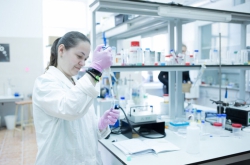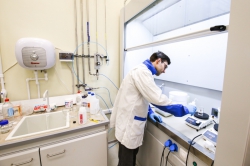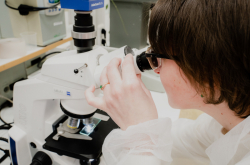Sergei Movchan, St. Petersburg's Vice Governor, personally came to congratulate UMNIK program awardees.
"4,000 contestants entered this competition; only a 100 made it to the semi-finals; now there are 25 of you. This is not the first time I've had the pleasure of participating in such a ceremony. The important task of the nation's leadership and educational establishments is to make it so that everything that you've invented would be introduced in the nation's economy. All of that are part of today's reality, and you will have to live with it. Today, 25 new people have joined those who will teach, manage enterprises and invent new technologies for our future. I wish you all the best of luck."

Sergei Movchan
ITMO's Rector Vladimir Vasilyev also greeted the young scientists.
"The UMNIK program is a great success and the Innovation Promotion Fund does a lot to make it so that ideas that come to bright minds would be realized in products, technologies, and services that can further develop our innovative economy. What's most important is that the ideas you have should be implemented in order to benefit our people, our city and the country in general," shared ITMO's Rector.
 Winners of the UMNIK grants
Winners of the UMNIK grants
Among the 25 winners, three represent ITMO University. These young researchers discussed the projects they’ll be working on over the course of the next two years.
Daniil Abrashin, Ph.D. student at ITMO's Department of Financial Management and Audit
My research is aimed at developing energy-efficient cooling systems. I work with Peltier elements; my idea is to create Peltier elements cured with fullerene and use this technology for computer cooling. Some time ago, a similar idea was researched at one of ITMO University's international laboratories (unfortunately, it is now defunct and I haven't had the chance to participate in it) which included specialists from the California Institute of Technology, Ioffe Institute, ITMO and several Turkish scientists; I’m currently reviewing their results, which I want to use as a basis for a practical device. This is what I received the grant for. Amongst my short-term objectives is conducting experiments and learning the efficiency rates of thermoelectrical units.
 Daniil Abrashin
Daniil Abrashin
Natalya Khanjina, research associate at ITMO's Computer Technologies International Laboratory
I focus on pollen grain recognition using deep learning, which has many practical applications. For instance, it is important in helping people suffering from allergies and asthma. Nowadays, about 30% of the population suffers from different types of allergies; pollen grain is a major allergen, and it is important to warn them of its presence in a timely manner.
 Natalya Khanjina
Natalya Khanjina
Apart from medicine, pollen recognition can be applied in other fields of human activity. For instance, there is a lot of research on using it in forensic science. By knowing the species and genus of pollen found at the crime scene, it is possible to define which area the perpetrator may have come from. In food science, pollen grain recognition can help assess the quality of honey - a program can identify the plants used for a particular batch of honey and determine its type.
The technology can also be used by paleontologists who study prehistoric flora and fauna, and even for discovering oil deposits.
Nikolai Smirnov, Ph.D. student at the Department of Information and Navigation Systems
My project focuses on developing software that solves the task of identifying errors in the performance of sensors. This software aims to help in designing systems that rely on sensors; we offer models of deviations that can be used to improve the systems' overall precision. As I study at the Department of Information and Navigation Systems, my project focuses on navigation systems (integrated navigation systems, for instance). Yet, the use of such a technology is not limited to this field only; in future, our software can be used in other fields such as car manufacturing or radio engineering, as well as for educational use.
 Nikolai Smirnov
Nikolai Smirnov
UMNIK is one of Russia's large-scale grant programs for young scientists working in the fields of IT, medicine, materials science, hardware systems, and biotech. The Innovation Promotion Fund supports UMNIK's most successful projects and provides additional grants for finalizing them. The grants will amount to 400 and 500 thousand rubles. UMNIK's award ceremony takes place in St. Petersburg twice a year.






